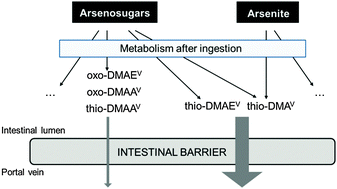Whereas inorganic arsenic is classified as a human carcinogen, risks to human health related to the presence of arsenosugars in marine food are still unclear. Since studies indicate that human inorganic arsenic metabolites contribute to inorganic arsenic induced carcinogenicity, a risk assessment for arsenosugars should also include a toxicological characterization of their respective metabolites. Here we assessed intestinal bioavailability of the human arsenosugar metabolites oxo-DMAAV, thio-DMAAV, oxo-DMAEV, thio-DMAEV and thio-DMAV in relation to arsenite in the Caco-2 intestinal barrier model. Whereas arsenite and thio-DMAV caused barrier disruption at concentrations ≥10 μM, all other metabolites did not cause a barrier leakage, even when applied at 50 times higher concentrations than arsenite and thio-DMAV. The transfer studies point to a strong intestinal bioavailability of thio-DMAV and thio-DMAEV, whereas oxo-DMAAV, thio-DMAAV and oxo-DMAEV passed the in vitro intestinal barrier only to a very small extent. Detailed influx and efflux studies indicate that arsenite and thio-DMAV cross the intestinal barrier most likely by passive diffusion (paracellular) and facilitated (transcellular) transport. LC-ICP-QMS based arsenic speciation studies during the transfer experiments demonstrate transfer of thio-DMAV itself across the intestinal barrier and suggest metabolism of thio-DMAV using the in vitro intestinal barrier model to its oxygen-analogue DMAV. In the case of arsenite no metabolism was observed. In summary the two arsenosugar metabolites thio-DMAV and thio-DMAEV showed intestinal bioavailability similar to that of arsenite, and about 10-fold higher than that reported for arsenosugars (Leffers et al., Mol. Nutr. Food Res., 2013, DOI: 10.1002/mnfr.201200821) in the same in vitro model. Thus, a presystemic metabolism of arsenosugars might strongly impact arsenic intestinal bioavailability after arsenosugar intake and should therefore be considered when assessing the risks to human health related to the consumption of arsenosugar-containing food.

This article is Open Access
 Please wait while we load your content...
Something went wrong. Try again?
Please wait while we load your content...
Something went wrong. Try again?


 Please wait while we load your content...
Please wait while we load your content...